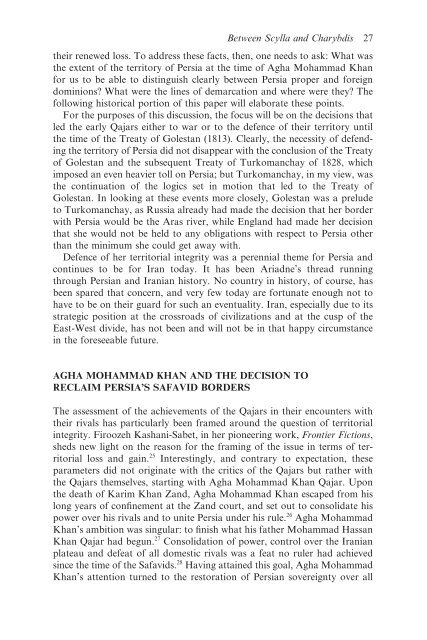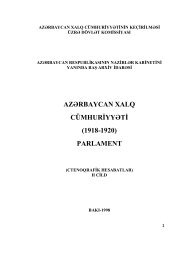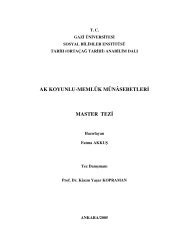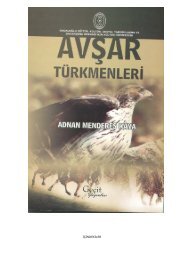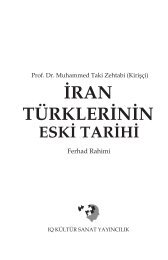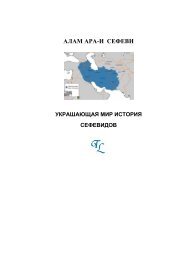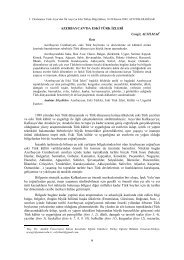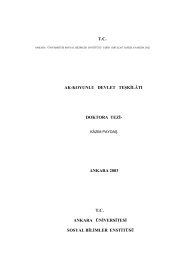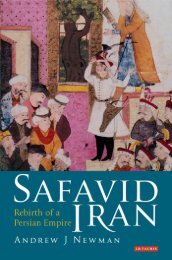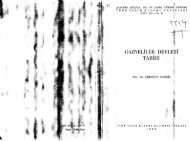War and Peace in Qajar Persia: Implications Past and ... - Oguzlar.az
War and Peace in Qajar Persia: Implications Past and ... - Oguzlar.az
War and Peace in Qajar Persia: Implications Past and ... - Oguzlar.az
- No tags were found...
Create successful ePaper yourself
Turn your PDF publications into a flip-book with our unique Google optimized e-Paper software.
Between Scylla <strong>and</strong> Charybdis 27their renewed loss. To address these facts, then, one needs to ask: What wasthe extent of the territory of <strong>Persia</strong> at the time of Agha Mohammad Khanfor us to be able to dist<strong>in</strong>guish clearly between <strong>Persia</strong> proper <strong>and</strong> foreigndom<strong>in</strong>ions? What were the l<strong>in</strong>es of demarcation <strong>and</strong> where were they? Thefollow<strong>in</strong>g historical portion of this paper will elaborate these po<strong>in</strong>ts.For the purposes of this discussion, the focus will be on the decisions thatled the early <strong>Qajar</strong>s either to war or to the defence of their territory untilthe time of the Treaty of Golestan (1813). Clearly, the necessity of defend<strong>in</strong>gthe territory of <strong>Persia</strong> did not disappear with the conclusion of the Treatyof Golestan <strong>and</strong> the subsequent Treaty of Turkomanchay of 1828, whichimposed an even heavier toll on <strong>Persia</strong>; but Turkomanchay, <strong>in</strong> my view, wasthe cont<strong>in</strong>uation of the logics set <strong>in</strong> motion that led to the Treaty ofGolestan. In look<strong>in</strong>g at these events more closely, Golestan was a preludeto Turkomanchay, as Russia already had made the decision that her borderwith <strong>Persia</strong> would be the Aras river, while Engl<strong>and</strong> had made her decisionthat she would not be held to any obligations with respect to <strong>Persia</strong> otherthan the m<strong>in</strong>imum she could get away with.Defence of her territorial <strong>in</strong>tegrity was a perennial theme for <strong>Persia</strong> <strong>and</strong>cont<strong>in</strong>ues to be for Iran today. It has been Ariadne’s thread runn<strong>in</strong>gthrough <strong>Persia</strong>n <strong>and</strong> Iranian history. No country <strong>in</strong> history, of course, hasbeen spared that concern, <strong>and</strong> very few today are fortunate enough not tohave to be on their guard for such an eventuality. Iran, especially due to itsstrategic position at the crossroads of civilizations <strong>and</strong> at the cusp of theEast-West divide, has not been <strong>and</strong> will not be <strong>in</strong> that happy circumstance<strong>in</strong> the foreseeable future.AGHA MOHAMMAD KHAN AND THE DECISION TORECLAIM PERSIA’S SAFAVID BORDERSThe assessment of the achievements of the <strong>Qajar</strong>s <strong>in</strong> their encounters withtheir rivals has particularly been framed around the question of territorial<strong>in</strong>tegrity. Firoozeh Kashani-Sabet, <strong>in</strong> her pioneer<strong>in</strong>g work, Frontier Fictions,sheds new light on the reason for the fram<strong>in</strong>g of the issue <strong>in</strong> terms of territorialloss <strong>and</strong> ga<strong>in</strong>. 25 Interest<strong>in</strong>gly, <strong>and</strong> contrary to expectation, theseparameters did not orig<strong>in</strong>ate with the critics of the <strong>Qajar</strong>s but rather withthe <strong>Qajar</strong>s themselves, start<strong>in</strong>g with Agha Mohammad Khan <strong>Qajar</strong>. Uponthe death of Karim Khan Z<strong>and</strong>, Agha Mohammad Khan escaped from hislong years of conf<strong>in</strong>ement at the Z<strong>and</strong> court, <strong>and</strong> set out to consolidate hispower over his rivals <strong>and</strong> to unite <strong>Persia</strong> under his rule. 26 Agha MohammadKhan’s ambition was s<strong>in</strong>gular: to f<strong>in</strong>ish what his father Mohammad HassanKhan <strong>Qajar</strong> had begun. 27 Consolidation of power, control over the Iranianplateau <strong>and</strong> defeat of all domestic rivals was a feat no ruler had achieveds<strong>in</strong>ce the time of the Safavids. 28 Hav<strong>in</strong>g atta<strong>in</strong>ed this goal, Agha MohammadKhan’s attention turned to the restoration of <strong>Persia</strong>n sovereignty over all


